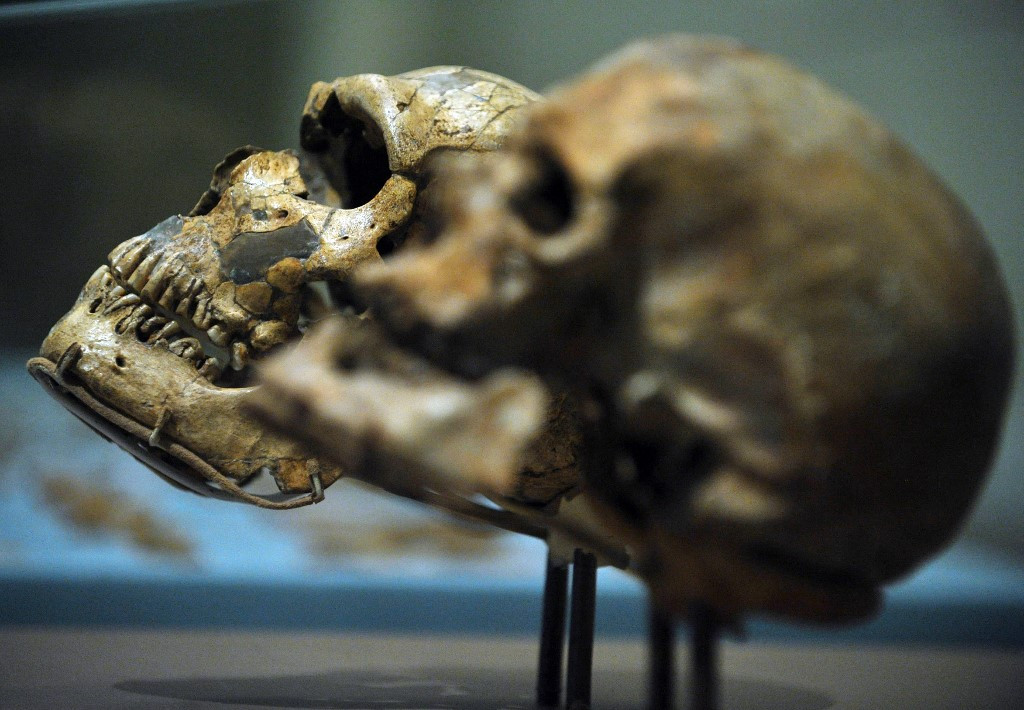Popular Reads
Top Results
Can't find what you're looking for?
View all search resultsPopular Reads
Top Results
Can't find what you're looking for?
View all search resultsResearchers decode oldest human DNA from South Africa to date
The genetic sequences were from a man and a woman whose remains were found at a rock shelter near the southern coastal town of George, about 370 kilometres (230 miles) east of Cape Town, said University of Cape Town (UCT) biological anthropology professor Victoria Gibbon.
Change text size
Gift Premium Articles
to Anyone
 A March 17, 2010 photo shows the skull of the Homo Sapiens (Cro-Magnon 1) (right) from Cro-Magnon, France and the Homo Neanderthalensis (left) (La Ferrassie 1) from La Ferrassie Rock Shelter, France on display at the Smithsonian National Museum of Natural History in Washington, DC. (AFP/Mandel Ngan)
A March 17, 2010 photo shows the skull of the Homo Sapiens (Cro-Magnon 1) (right) from Cro-Magnon, France and the Homo Neanderthalensis (left) (La Ferrassie 1) from La Ferrassie Rock Shelter, France on display at the Smithsonian National Museum of Natural History in Washington, DC. (AFP/Mandel Ngan)
R
esearchers have reconstructed the oldest human genomes ever found in South Africa from two people who lived around 10,000 years ago, allowing a better understanding of how the region was populated, an author of the study said Sunday.
The genetic sequences were from a man and a woman whose remains were found at a rock shelter near the southern coastal town of George, about 370 kilometres (230 miles) east of Cape Town, said University of Cape Town (UCT) biological anthropology professor Victoria Gibbon.
They were among 13 sequences reconstructed from people whose remains were found at the Oakhurst shelter and lived 1,300-10,000 years ago. Prior to these discoveries, the oldest genomes reconstructed from the region dated back around 2,000 years.
A surprise finding from the Oakhurst study was that the oldest genomes were genetically similar to those from San and Khoekhoe groups living in the same region today, UCT said in a statement.
"Similar studies from Europe have revealed a history of large-scale genetic changes due to human movements over the last 10,000 years," said lead author of the study, Joscha Gretzinger, in the statement.
"These new results from southernmost Africa are quite different, and suggest a long history of relative genetic stability," said Gretzinger, from the Max Planck Institute for Evolutionary Anthropology in Leipzig, Germany, which participated in the study.
DNA data currently show this only changed around 1,200 years ago when newcomers arrived and introduced pastoralism, agriculture and new languages to the region, and began interacting with local hunter-gatherer groups.
Even though some of the world's earliest evidence of modern humans can be traced to southern Africa, it tends to be poorly preserved, Gibbon told AFP. Newer technology made it possible to obtain this DNA, she said.
Unlike in Europe and Asia where the genomes of thousands of people have been reconstructed, fewer than two dozen ancient genomes have been recovered from southern Africa, specifically Botswana, South Africa and Zambia.
"Sites like this are rare in South Africa, and Oakhurst has allowed for a better understanding of local population movements and relationships across the landscape over nearly 9,000 years," Gibbon said.










